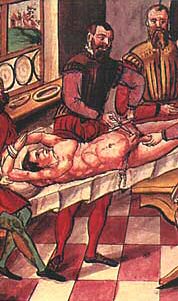Castration
Castration is a medical or surgical procedure involving the removal of the testicles in a male, or the ovaries (and sometimes the uterus) in a female. It has been practiced for various reasons throughout history, including as a means of birth control, punishment, and to produce certain desired characteristics in domestic animals.
History[edit | edit source]
The history of castration is both ancient and varied. In ancient civilizations, such as those of China, India, and Rome, castration was often performed for various reasons, including as a punishment for enemies or criminals, to create a class of servants or slaves known as eunuchs who were trusted to guard harems or perform administrative duties, and for religious or social reasons.
Medical Reasons[edit | edit source]
In modern times, castration is performed for several medical reasons. In animals, it is commonly done to control breeding, reduce aggressive behavior, and prevent certain diseases. In humans, the procedure might be necessary as a treatment for testicular cancer, prostate cancer, or other medical conditions where removal of the testes or ovaries is deemed necessary. It can also be part of gender reassignment surgery for transgender individuals.
Surgical Procedure[edit | edit source]
The surgical procedure for castration varies depending on the species and the reason for the castration. In males, it involves the removal of the testicles, and in females, the removal of the ovaries, and sometimes the uterus. The procedure can be performed under general or local anesthesia, and the individual may be given pain relief medication during the recovery period.
Effects[edit | edit source]
The effects of castration can vary. In animals, it typically leads to reduced aggression, less desire to roam, and changes in physical characteristics, such as reduced muscle mass. In humans, the removal of the testes or ovaries results in sterility and can lead to hormonal imbalances that may require hormone replacement therapy. There can also be psychological effects, depending on the circumstances surrounding the castration.
Ethical and Legal Considerations[edit | edit source]
Castration raises ethical and legal considerations, particularly when it is performed without consent or for reasons other than medical necessity. The practice has been condemned by various human rights organizations when used as a form of punishment or coercion. Laws regarding castration vary by country and in some places, voluntary castration for reasons other than medical necessity is illegal.
In Popular Culture[edit | edit source]
Castration has been a subject in literature, film, and television, often depicted in historical or fantasy contexts. It is used to explore themes of power, control, and gender dynamics.
Search WikiMD
Ad.Tired of being Overweight? Try W8MD's NYC physician weight loss.
Semaglutide (Ozempic / Wegovy and Tirzepatide (Mounjaro / Zepbound) available. Call 718 946 5500.
Advertise on WikiMD
|
WikiMD's Wellness Encyclopedia |
| Let Food Be Thy Medicine Medicine Thy Food - Hippocrates |
Translate this page: - East Asian
中文,
日本,
한국어,
South Asian
हिन्दी,
தமிழ்,
తెలుగు,
Urdu,
ಕನ್ನಡ,
Southeast Asian
Indonesian,
Vietnamese,
Thai,
မြန်မာဘာသာ,
বাংলা
European
español,
Deutsch,
français,
Greek,
português do Brasil,
polski,
română,
русский,
Nederlands,
norsk,
svenska,
suomi,
Italian
Middle Eastern & African
عربى,
Turkish,
Persian,
Hebrew,
Afrikaans,
isiZulu,
Kiswahili,
Other
Bulgarian,
Hungarian,
Czech,
Swedish,
മലയാളം,
मराठी,
ਪੰਜਾਬੀ,
ગુજરાતી,
Portuguese,
Ukrainian
Medical Disclaimer: WikiMD is not a substitute for professional medical advice. The information on WikiMD is provided as an information resource only, may be incorrect, outdated or misleading, and is not to be used or relied on for any diagnostic or treatment purposes. Please consult your health care provider before making any healthcare decisions or for guidance about a specific medical condition. WikiMD expressly disclaims responsibility, and shall have no liability, for any damages, loss, injury, or liability whatsoever suffered as a result of your reliance on the information contained in this site. By visiting this site you agree to the foregoing terms and conditions, which may from time to time be changed or supplemented by WikiMD. If you do not agree to the foregoing terms and conditions, you should not enter or use this site. See full disclaimer.
Credits:Most images are courtesy of Wikimedia commons, and templates, categories Wikipedia, licensed under CC BY SA or similar.
Contributors: Prab R. Tumpati, MD





